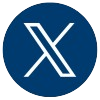Student Success Center
MS in Engineering, Sustainability and Health
Welcome!
As an online student, most of your interactions with the university will be done through various websites. For example:
- You'll use your USD Email Address for all university-related communications.
- You'll use Canvas for all of your coursework and assignments. See Canvas Tips and Tricks page.
- You’ll use your MySanDiego Portal for tuition payments and to access most campus resources.
- You’ll use this site, your Student Success Center, to get specific information about textbook information, deadlines, and more!
- If you identify as alumni, visit our Alumni page to remain engaged.
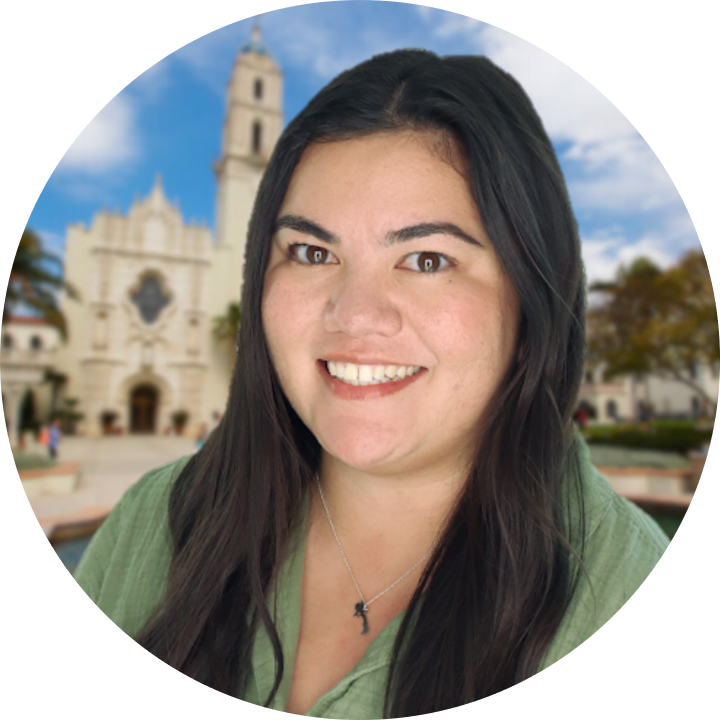
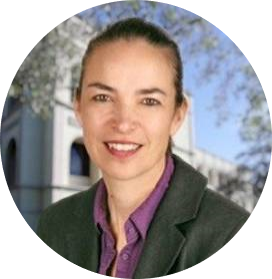
COMPLETE YOUR MANDATORY NEW STUDENT CHECKLIST
Our number one priority is you! Our team has prepared a checklist of items that will set you up for success and clarify all action items as a new student. After you are enrolled for your first term and receive a confirmation email from a member of our team, please complete and review all of the following before classes start.
1. View Your Mandatory New Student Welcome Webinar
This webinar will go over a comprehensive look at your program and what to expect as an online learner including resources and tips for success. Each webinar should last around 30-40 minutes. Once you have been registered for classes and receive a confirmation email from our team, you will be emailed the link to schedule your welcome webinar to your @sandiego.edu email address.
2. Schedule Your New Student Check-in Call
In this call, you’ll “meet” a member of your Student Success Team for your program. This will be a chance for us to answer any additional questions you have before you start your first term. Please be sure to have any Canvas-related, program-related, or finance-related questions prepared. After attending the Welcome Webinar, you will be prompted to schedule your call using a scheduling link.
3. Complete Your Canvas Orientation Course - Due August 29, 2025
Once you have been registered in your classes, you will be able to access your New Student Orientation Course on Canvas within 4 hours. When accessing Canvas, please make sure to use Firefox or Chrome as your browser.
The New Student Orientation course is designed to help you navigate your way around the course's layout prior to beginning your first class. You will learn where to find the syllabus, course schedule, assignments, and the discussion board.
Your Orientation is mandatory, and must be completed before the first day of class—so we encourage you to get started! Please plan to spend about 6-8 hours completing the Orientation course. You can move through the Orientation at your own pace, so schedule your time accordingly.
Looking for assistance?
4. Finalize Your Tuition Payment Plan
We recommend that students start this planning early as some funding sources can take some time to process. Tuition payments should be completed in full by the first day of the semester. Visit the "Tuition and Payment Methods" section for more information.
5. Review your Student Handbook
Please make sure to review your student handbook prior to the first day of class, and reference it as needed throughout your program. The handbook is where you can find information on academic expectations, drop and refund policy, technology requirements, curriculum, frequently asked questions, and more.
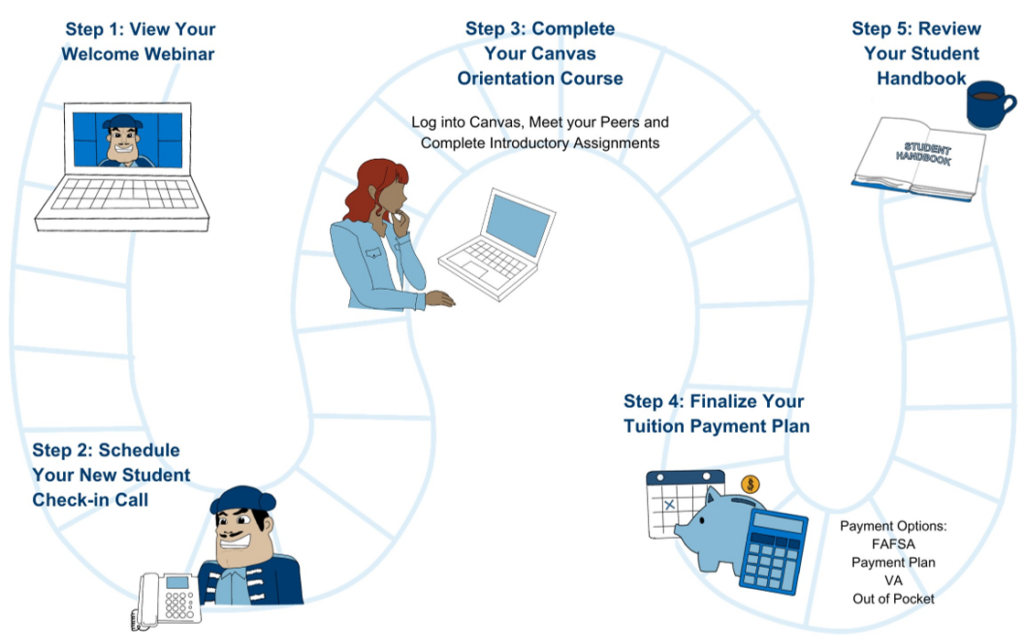
IMPORTANT DATES
Below is a list of significant dates regarding the registration process, payment deadlines, and other important academic and program deadlines.
Fall 2025 Dates and Deadlines
| Important Dates | Date |
|---|---|
| Registration Opens | June 30, 2025 |
| Application Deadline | August 1, 2025 |
| Registration Deadline | August 15, 2025 |
| Orientation Course Due Date | August 29, 2025 |
| Last Day to Drop with 100% Tuition Refund* | September 1, 2025 |
| Payment Due Date | September 2, 2025 |
| Semester Begins | September 2, 2025 |
| First Course Start Date | September 2, 2025 |
| Last Day to Drop with 95% Tuition Refund/ Drop Deadline* | September 5, 2025 |
| Last Day to Withdraw from Course A | September 29, 2025 |
| First Course End Date | October 20, 2025 |
| Second Course Start Date | October 21, 2025 |
| First Course Final Grade Submission Due Date | November 3, 2025 |
| Last Day to Withdraw from Course B | November 17, 2025 |
| Second Course End Date | December 8, 2025 |
| Semester Ends | December 8, 2025 |
| Second Course Final Grade Submission Due Date | December 22, 2025 |
Spring 2026 Dates and Deadlines
| Important Dates | Date |
|---|---|
| Registration Opens | November 3, 2025 |
| Application Deadline | December 1, 2025 |
| Registration Deadline | December 15, 2025 |
| Orientation Course Due Date | January 2, 2026 |
| Last Day to Drop with 100% Tuition Refund* | January 5, 2026 |
| Payment Due Date | January 6, 2026 |
| First Course Start Date | January 6, 2026 |
| Last Day to Drop with 95% Tuition Refund/ Drop Deadline* | January 9, 2026 |
| Last Day to Withdraw from Course A | February 2, 2026 |
| First Course End Date | February 23, 2026 |
| Second Course Start Date | February 24, 2026 |
| First Course Final Grade Submission Due Date | March 9, 2026 |
| Last Day to Withdraw from Course B | March 23, 2026 |
| Second Course End Date | April 13, 2026 |
| Semester Ends | April 13, 2026 |
| Second Course Final Grade Submission Due Date | April 27, 2026 |
Summer 2025 Dates and Deadlines
| Important Dates | Date |
|---|---|
| Registration Opens | March 3, 2025 |
| Application Deadline | April 4, 2025 |
| Registration Deadline | April 18, 2025 |
| Orientation Course Due Date | May 2, 2025 |
| Last Day to Drop with 100% Tuition Refund* | May 5, 2025 |
| Payment Due Date | May 6, 2025 |
| Semester Begins | May 6, 2025 |
| First Course Start Date | May 6, 2025 |
| Last Day to Drop with 95% Tuition Refund/ Drop Deadline* | May 9, 2025 |
| Last Day to Withdraw from Course A | June 2, 2025 |
| First Course End Date | June 23, 2025 |
| Second Course Start Date | June 24, 2025 |
| First Course Final Grade Submission Due Date | July 7, 2025 |
| Last Day to Withdraw from Course B | July 21, 2025 |
| Second Course Final Grade Submission Due Date | August 25, 2025 |
| Semester Ends | August 11, 2025 |
* During the first semester of enrollment, any tuition refund amounts will not include the non-refundable enrollment deposit amount (5% of tuition).
Graduate Student Success Program
Dates: July 28-30th, 2025
The Graduate Student Success Program is an optional opportunity for students to unpack the hidden curriculum of graduate school, connect with other graduate students across the university, and feel empowered to step into the new identity of being a graduate student and scholar. Through workshops and presentations, our virtual program will address questions such as:
- How do I make the most of my experience as a graduate student?
- What if I feel like I don’t belong here?
- How do I interact with faculty as a graduate student?
- How do I tend to my financial wellness while in graduate school?
- What are some strategies to access support?
Download a pdf of your academic calendar
Upcoming Events
Don't miss out on connecting with your University of San Diego global community through a variety of events - featuring academic workshops, cultural celebrations, networking events, and more. There’s something for everyone!
Class Registration Directions
You have most likely already filled out an Enrollment Agreement, which enables our team to register you for classes each term. No further action is required on your part.
If you are not able to register for both of your courses in a given term, please contact your program coordinator immediately. This often happens for students who need to take a leave of absence.
Textbook information
Students are required to have their textbooks on hand by the first day of class. Unless otherwise specified, students may select any vendor they prefer (such as Amazon.com, Half.com, Alibris.com, etc.) to purchase their course materials. In the event a specific vendor is required, it will be specified in the course materials list. The best way to ensure that you have the correct book is to search by the ISBN number(s) listed on the book list.
Physical copies of books are not on hand at the USD Torero Store. The USD Torero online store does offer price comparisons for different online vendors for some books.
Although all textbooks for all courses are listed, students only need to purchase the items for the classes they are taking for the semester.
Digital Inclusive Access (IA) - Integrated VitalSource Textbooks
If your course is indicated to have a "Digital Inclusive Access" textbook, you do have the option to use the integrated Vitalsource e-textbook without needing to purchase a textbook through an outside vendor. For more information, view the "Digital Inclusive Access" FAQs document.
- Students are able to access the e-textbook directly in the course without worrying about purchasing the wrong version or textbook!
- If your course is indicated as using “Digital Inclusive Access” on the textbook list, please note that you must opt-out within the first 7 days of each course to avoid being charged for the guaranteed-lowest price textbook.
- If you do intend to use “Digital Inclusive Access”, no further action is required after you create a Vitalsource account.
- No refunds can be issued once the textbook charge has been assessed.
By using Vitalsource e-Textbooks, students are able to use study tools in Bookshelf such as highlighting, printing limited pages/chapters, sharing notes, and using the Bookshelf CoachMe tool to test their learning while they read.
PAYing for your program
Tuition at USD is billed per semester, not per course. Payment (or enrollment in an official USD payment plan) is always due by the first day of the semester. Students may not carry balances from one semester to the next.
Accounts with outstanding balances after the official payment due date may be subject to course cancellations/removal or a student account hold during the semester; related holds can prevent upcoming registration, graduation, or obtaining transcripts.
Remember: tuition is always due by the first day of each semester.
Tuition amounts shown on this website, or in other university publications or web pages, represent tuition and fees as currently approved. However, the University of San Diego reserves the right to increase or modify tuition and fees without prior notice and to make such modifications applicable to students enrolled at USD at that time as well as to incoming students. In addition, all tuition amounts and fees are subject to change at any time for correction of errors.
The University of San Diego has identified the following MESH (Master of Science in Engineering, Sustainability, and Health) related scholarship opportunities. Take a look at the links below and let me know if you have any questions. Please note that the following scholarships are not offered directly through the University of San Diego.
45 Green Scholarships for Higher Education
Environmental, Conservation & Sustainability Scholarships
The Ultimate List of Sustainability Scholarships
Program Tuition
Once you have been registered for your courses, your student account will reflect the appropriate tuition costs according to your program. Payments not received by the deadlines are subject to late fees. Your program’s tuition is the following:
- Per Unit (classes are typically 3-units) = $965
- Per Semester (assuming 6-units per semester) = $5,790
- Total Program Cost (including 5 semesters) = $28,950
Students who need to re-take or withdraw from a course may need to pay additional fees according to the Refund/Drop Deadline policies listed in your Student Handbook.
If you have any questions about your Student Account, please reach out to the Torero Hub by submitting their inquiry form or phone at 619-260-2700. All costs and fees are subject to change and are based on the academic year of enrollment.
ENROLLMENT DEPOSIT
Please note that students in USD’s MS in Engineering, Sustainability and Health program are required to submit a one-time 5% non-refundable deposit. The payment will automatically be applied to your first-semester tuition.
Refund Policy
Students will be registered for their prescribed courses each semester. All courses must be dropped prior to the first day of the semester to receive a 100% tuition refund* and within the first three days of the start date of the semester to receive a 95% tuition refund*. No refund (reversal of tuition) will be provided after the third day of the semester for any class. *During the first semester of enrollment, any tuition refund amounts will not include the non-refundable enrollment deposit amount (5% of tuition).
DEGREE PROGRESS and COMMENCEMENT
DegreeWorks
You can track your progress toward earning your degree using the Degree Works feature in your MySanDiego student portal. Degree Works shows you which courses you have completed, grades, cumulative GPA, any outstanding graduation requirements, and more!
To access Degree Works:
- Log in to your MySanDiego student portal.
- Under the “Torero Hub” tab, click on “My Academics.”
- On the right-hand side under “My Academic Resources”, click on “Degree Works.”
Petition to Graduate
Submitting your petition to graduate is a requirement for every student. About a semester before your final term, you will be reminded by your Program Coordinator to submit your petition to graduate. Once completed, your Academic Coordinator will review your academic record and contact you if there are any outstanding requirements or issues.
Commencement timing
If you are planning on participating in the commencement ceremony (which means walking in your cap and gown here on campus), you will be invited to come to the University of San Diego to participate in the ceremony. Commencement details and information will be sent from your Student Success Team around the month of February.
- There is only one commencement ceremony each academic year in May.
- Fall and Spring graduates will be invited to the commencement ceremony the May after they graduate.
- Summer graduates will be invited to the commencement ceremony the May before they graduate.
Diploma Details
The Registrar will process their final audit of the degrees 6-8 weeks after grades are posted for your final semester. Once the degree is conferred in the system, the Registrar will order your diploma from the vendor and the vendor will send it to you directly to the address that was listed on your petition to graduate.
If your mailing address changes after you submit your Petition to Graduate, please notify the Graduate Records office at (619) 260-2217 or [email protected].
You will receive a digital diploma to your @sandiego.edu email address once your degree has been officially conferred.
You will also receive a physical diploma. Mailing time is an additional 6-8 weeks from the date of order, and you will likely receive your diploma in the mail in 3-4 months after you have completed your degree requirements.
Course Details
program requirements
Completion of all the courses in the prescribed curriculum, of eight 3-unit courses and one 6-unit capstone course for a total of nine courses and 30 units, is required to successfully complete this program.
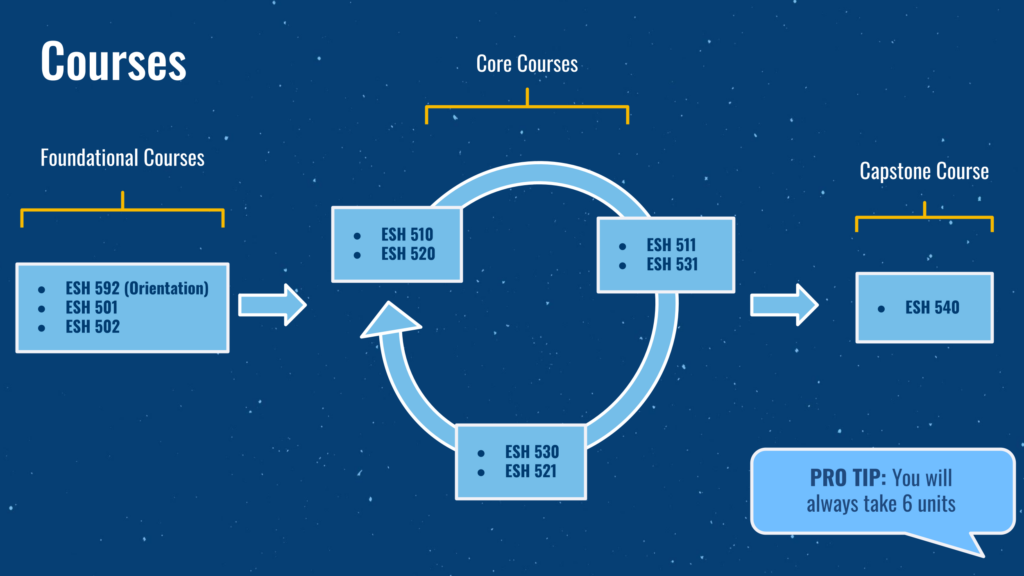
Course Titles and Descriptions
Engineering and the Health of the Planet (ESH 501)
Students will be introduced to MESH, and the complex adaptive systems that will be examined over the next few months in relation to engineering, health and sustainability. They will begin to develop or enhance their critical thinking skills and ability to question assumptions relating to contemporary practices and processes. Students will explore how changes to earth systems, facilitated or exacerbated by technological developments, affect human health, ecosystems, environmental justice and ethics, within political, economic and social systems. They will develop their sustainability design skills and apply critical lenses to a variety of engineering applications to consider potential negative human and ecosystem health impacts and possible ways to mitigate these. The course will be taught as a series of case studies within a wide range of engineering disciplines and draw where possible on areas specifically connected to the students’ own areas of interest and backgrounds.
Health and the Built Environment (ESH 502)
This course will critically examine the complex interplay of engineering, development, and changes to the built environment, and their impacts on population health from community to global levels. Students will employ transdisciplinary and complex systems approaches to better understand how changes to the built-environment can impact health outcomes, and thereby foster an awareness of the unintended outcomes of their work and the need for intentionality in planning, design and implementation of engineering projects. This course will also cultivate an appreciation of the important, but often overlooked, need to develop social infrastructure in tandem with the development of physical infrastructure.
Sustainable Food (ESH 510)
This course examines the complex and interconnected world of health, politics, economics, ecology, engineering, sustainability, and justice in relation to food systems and food production. We explore the methods and impacts of land use and food production and distribution through a social science and historical lens. An understanding of the complex social factors and unsustainable practices impacting malnutrition, obesity, and non-communicable and communicable diseases will be essential to be able to redress these challenges. Specifically, food insecurity, food deserts, commerciogenic malnutrition, and famine will be critically examined, as will the impact of transnational food monopolies, foreign direct investment, and the World Trade Organization on food cost, accessibility, and safety. Alternative, sustainable, and just practices of food production and distribution that draw on both traditional and contemporary movements will be mined for innovative solutions that promote human, environmental, and planetary health. Prerequisites: ESH 501 and ESH 502
Sustainable Water (ESH 511)
This course explores water and its interconnections with environmental sustainability, social equity, health, and economic development. With the understanding of sustainable access to clean water as a fundamental human right, students will re-envision and create a world where water engineering and management support a healthy ecosystem for both people and the planet. We will explore water scarcity, water access, and engineering innovations in water supply, drinking and waste water, efficiency of distribution, as well as the impact of engineering on water quality and ecosystem health. Throughout the course, students will consider the interrelated aspects of engineering and water in relation to health, justice, and sustainability. The course will adopt a case study approach and students will 'virtually' visit multiple contexts and countries in order to explore the real-life implications of access to life-giving water. Prerequisites: ESH 501 and ESH 502
Sustainable Energy (ESH 520)
This survey course introduces students to energy systems, technologies, governance, and policies through the lens of sustainability. Students completing the course will develop a holistic understanding of how these components currently fit together, the justice and security implications that they create, and how they need to evolve as part to the ongoing energy transition. As part of this journey, students will develop skills for analyzing the state and trends of the U.S. and global energy systems, assessing energy production and consumption data, and evaluating options for delivering energy services in a sustainable and equitable manner. In addition, students will apply the material learned throughout the course to a real-life scenario of their choice and will be able to incorporate the results into their MESH project. Prerequisites: ESH 501 and ESH 502
Getting to Zero Waste (ESH 521)
This course will explore all elements of the global waste problem from recycling and reusing, to reducing consumption and production, and the practicalities of getting to zero waste. We will examine the idea of circular economies and circularity of materials, inspired by nature to reduce our waste to zero. Critique of contemporary and alternative processes will be facilitated by reviewing the interconnected social, political, economic, environmental and technical implications. Case studies will be explored in different parts of the world and framed in new approaches to the ecological paradigm of moving from waste as a problem to ‘waste as a resource’. Prerequisites: ESH 501 and ESH 502
Transitioning to Alternatives (ESH 530)
The “Just Transition” framework, emerging from the intersection of climate justice and labor movements, supports both the environment and the worker through a set of principles, processes, and practices that are place-based and yet universal. These principles, processes, and practices address the root-causes of climate change by working to transform the imperialist, colonial, and hierarchical relationships among Peoples, with the Earth, and with knowledge production to just, equitable, and regenerative relations through cooperative economies, direct democracy, and public-interest knowledge production. In this course, we shall explore the potential and promise of such a transition. We shall explore how to reduce extraction by reducing consumption, how to reduce waste by producing for need instead of profit, and how to create non-hierarchical organizational structures in cooperative economies. We shall evaluate the roots and limits of existing ‘corporate metrics’ that measure “progress” towards sustainability by learning from the experiences of historically and currently marginalized communities that are first and most affected by climate change. We aim at co-creating ‘metrics’ with the grassroots movements that facilitate the path towards a just transition. Prerequisites: ESH 501 and ESH 502
Environmental Justice (ESH 531)
This course will examine the interconnection of industrial and infrastructure development and with environmental issues related to community health, social and environmental justice. Evidence is mounting that unprecedented economic growth experienced by human societies has induced a state of crisis for the Earth’s ecological systems. Many of the public goods provided by them – fresh water, clean air, abundant fisheries, nutritious soils, low sea levels, and moderate weather -- are increasingly at risk. The engineering systems which are needed to support human activity require resource materials and energy at unprecedented rates. Extraction and manufacture of these have the greatest impacts on the most vulnerable societies, which have already suffered the historical impacts of colonization. In this course, we will explore specific issues in an applied, place-based framework, focusing on ways of understanding larger challenges as they manifest themselves. We will also ask fundamental questions about environmental justice, exploring how social power dynamics along racial, economic, and cultural lines are pertinent to understanding people’s disproportionate access to clean, safe, and productive environments, on the one hand, and their unequal exposure to environmental harms, on the other. Through the examination of contemporary case studies, students in this course will be able to demonstrate an advanced level of understanding about the social causes and consequences of environmental racism and inequality, as well as the ways that innovation in engineering can alternately perpetuate environmental inequality and alleviate it. Prerequisites: ESH 501 and ESH 502
Capstone Project (ESH 540)
Participants will embark on a practicum or research project in which they critically review current knowledge and practice in one area of interest and either develop a model and feasibility study or a significant change to their own or others' practice and explore the impact of this change. This project will run throughout the entire program and relate to all courses. They will be supported throughout the process with critical thinking skills, as well as sustainable design tools and methodologies. For professionals, the project could be based on their own work context. For participants who are not engaged in practice, projects can be arranged as internships for other organizations (online or face to face at a location accessible to participants). It is also possible to conduct a research study for an intended audience. The project might include, but is not limited to: a feasibility study for the development of a new interdisciplinary sustainability/health/engineering process within an organization; conducting a feasibility study and design of a locally appropriate interdisciplinary intervention in a specific context; collaboration with a community organization or NGO/INGO to design a project or training scheme for engineers and healthcare and development professionals in local culture, environmental, health issues, and human rights; design projects that identify and incorporate appropriate solutions for collaboration between environmental scientists, engineers and health and/or development professionals. Students publish their final work in a special issue of the MESH magazine enabling them to present their projects to a global audience. Prerequisites: ESH 501, ESH 502, ESH 510, ESH 511, ESH 520, ESH 521, ESH 530, and ESH 531
Student Resources
This list is helpful resources that will set you up for success. Haven’t written in APA formatting since your undergraduate program? We’ve got you covered! Want to know what type of computer you will need? No problem. We have listed helpful resources below.
Academic Requirements and Resources
Technical Requirements
You must own or have unrestricted access to a computer for this program. A fast Internet connection is also mandatory.
Courses will utilize a variety of technologies and multimedia. To complete course activities and to access course content, please verify that you have the following technologies and plug-ins available:
High-speed internet connection strongly encouraged (DSL or better)
Browser Plug-ins – Windows Media Player, QuickTime, Shockwave, Adobe Reader, and Java.
Mozilla Firefox is the recommended browser.
Microsoft Office is required. If you are using Office 2003 or earlier, download and install the Microsoft Office Compatibility pack.
Speakers or headset – to listen to multimedia.
Webcam – for recording video.
Email – To contact your faculty.
EdGE Omprakash Platform
The EdGE Omprakash platform is designed to be a shared space that unites community members across courses, cohorts, and areas of expertise. Within the EdGE Omprakash platform, MESH community members will be able to access professional development opportunities, supplementary learning resources, a group blog page, and more.
Welcome and join the EdGE space for your course.
View the EdGE Omprakash platform.
If you encounter a technical issue with the EdGE Omprakash platform, there are two ways to request support. First, from your EdGE Dashboard, you can hover over your name in the upper-right corner and select "Report an Issue" from the dropdown menu. Alternatively, you can also visit the 'help' section on your Main Dashboard. Either way, please provide a detailed description of the issue you are encountering, and an Omprakash team member will respond to help you!
Graduate Writing Expectations and Tips
All writing assignments must be formatted according to APA standards. Discussion posts must contain the appropriate APA citations. If you want additional writing support, we recommend Purdue Online Writing Lab (OWL@Purdue). In addition to general writing support, the website includes a special section dedicated to APA formatting guidelines.
Another helpful writing resource is the School of Leadership and Education Sciences (SOLES) Graduate Student Writing Center. Enrolled students can submit assignments for review by a writing professional.
Academic Standards for Artificial Intelligence (AI)
With the rise of AI writing assistants, students must ensure that they use this new technology ethically and honestly. Consult this document for guidance.
Download Microsoft Office 365 (Free for USD Students)
Students at the University of San Diego are able to download Microsoft Office 365 for free! If you don’t have it already, you can download the Microsoft Office 365 suite using your USD student email.
Accessibility Student Resources
Students may request formal accommodations from the Disability and Learning Difference Resources Center and may also use the following accessibility tools:
Accessibility Student Resources
Tailored Support for Neurodiverse College Students Webinar Recording
External Tutoring Resource
USD does not offer subject-specific tutoring resources, so students who are looking for tutoring support are encouraged to identify a tutor using Wyzant.com. Please note that Wyzant is not a USD-managed resource, so use them at your own discretion.
University Resources
TimelyCare - Telehealth for USD Students
TimelyCare is a provider of 24/7, no-cost telehealth services for USD students to address common conditions that can be safely diagnosed and treated remotely. TimelyCare services are available at no cost to the student. Services include:
- Live and on-demand self-care sessions (yoga, breathing, stretching)
- Access to on-demand counselors for emotional health support
- Access to schedule a session with a licensed counselor (up to 12 times per year)
- View the Nurturing Balance Webinar Recording to learn about more resources
Economic Resources List
USD's Case Management team has compiled a list of on-campus (local to San Diego) and national economic resources to help students find assistance with a variety of life aspects such as housing, food, mental health, parenting, etc. If you have a need or concern that isn’t addressed by the resources included in this list, please reach out to your Program Coordinator for further assistance. Based on the support, we may refer you to schedule an appointment with a case manager.
University Sustainability Resources
USD's Office of Sustainability has a lot of resources available to help the USD community reduce its carbon foot-print and find ways to increase sustainable practices.
The Office of Sustainability website is a great resource that contains more tips and a Data Dashboard detailing USD's progress.
View this Sustain-A-Tips video
Campus Partner Email Opt-Out
Get too many emails? Follow our email opt-out guide to optimize your USD email experience.
On-Campus Resources
If you live local to San Diego, the USD Campus is available to all of our students and includes these additional resources. Even if you far away from campus, many offices offer remote options.
identity resources
Military Student Resources
USD provides student-focused services to all USD military-connected students, including student veterans, active-duty, dependent children, and spouses.
- Get started by requesting your Request to Certify each semester.
- Explore Military Scholarship Opportunities.
- Join the Student Veteran Organization .
- Leverage the partnership between USD and 50strong that brings together employers and veterans.
- Upon graduation, connect with the Alumni Veteran Network
First-Generation Student Resources
USD welcomes first-generation college and first-generation graduate students. Please view the resources below to connect with your first-gen peers!
- Visit the USD First-Generation website.
- FirstGen Forward with Annual Free & Virtual Symposium.
- Instagram accounts: @usd_fgsa and @usdfirstgen.
- Contact the First-Gen Action Team at [email protected]
- View the USD First-Generation Student Guide.
- Sign up for the First-Gen Network Newsletter (sign up here).
- Facebook account: USD First-Generation Students.
- Watch the First Gen Wellness Webinar Recording.
Student Parent Resources
Many students who attend USD are also parents. USD offers the following resources:
- Join the Parenting Student listserv: [email protected]
- Pregnancy Resources: Several USD Centers are available to accompany pregnant students as they navigate pregnancy while a student at USD.
- Financial Aid: The university’s Financial Aid Offices can help you qualify for additional loans to cover medical expenses and child care.
- Childcare Solutions: USD supports many resources for finding infant and child care to meet your family’s needs.
- View a recording of our Student Parent Time Management webinar.
DACA/Undocumented Student Resources
Please view the USD information trifold for current and prospective students. It is also available in Spanish.
Review the Higher Ed Immigation Portal website which includes some useful information and connections to the undocumented student community, state and national policies, information on graduate and professional school access, retention and success. It is a living document that will be updated regularly and include any new resources that campuses and organizations develop.
Online Student Handbook
The handbook is where you can find information on academic expectations, drop and refund policy, technology requirements, curriculum, frequently asked questions, and more.
Graduate Student Code of Rights and Responsibilities
It is the policy of the University of San Diego to adhere to the rules and regulations as announced in this brochure or other University Publications. The University nevertheless hereby gives notice that it reserves the right to expand or delete or otherwise modify this online publication whenever such changes are adjudged by it to be desirable or necessary. Changes will be made periodically as needed.
Canvas @ USD
In your program, you can think of Canvas as your virtual tool to share information with professors and peers. You will use Canvas to access your course content, find course syllabi, review your assignments, and more. Be sure to use your USD credentials to log in. If you have any difficulty logging into your course, be sure to contact ITS at (619) 260-7900 or [email protected].
Netiquette Guidelines
The concept of netiquette covers proper communication online. Read our guidelines to help cultivate a supportive and productive online environment.
your partners toward success
At USD, you join a community of individuals who are all committed to one common goal: your success. As you familiarize yourself with your team, take the opportunity to virtually meet and connect with the resources available to you as a student. Click on the profiles below to learn more about each office or staff member and watch a brief video about their role in supporting you through graduation.
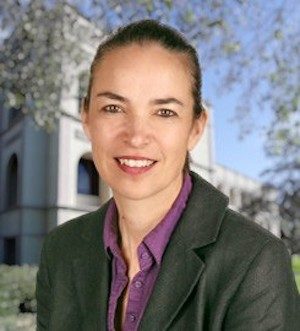
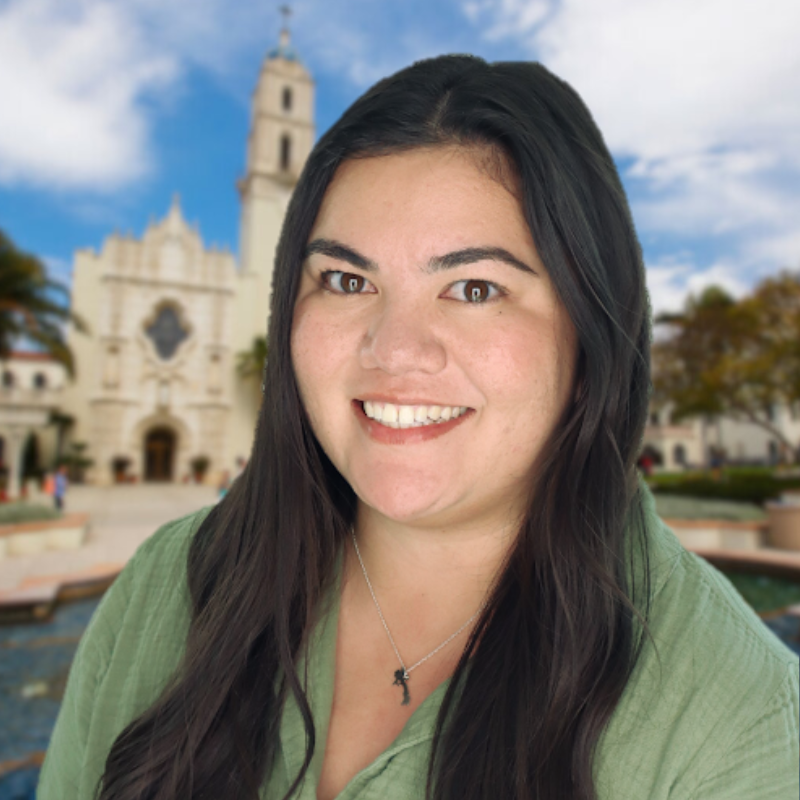
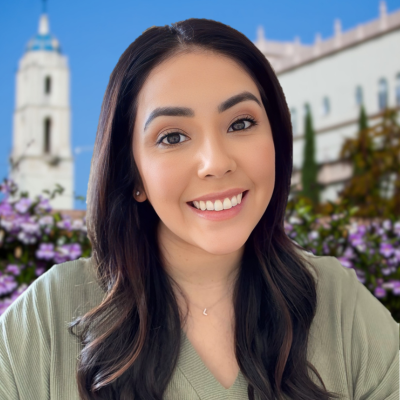
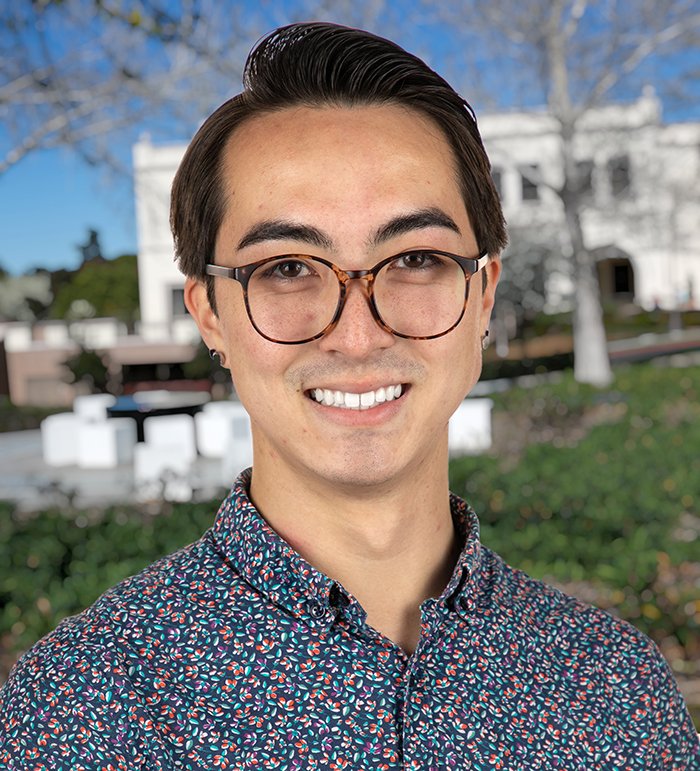
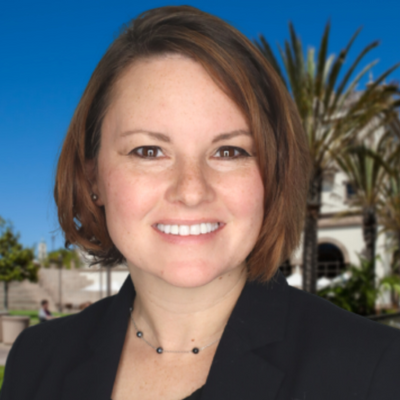


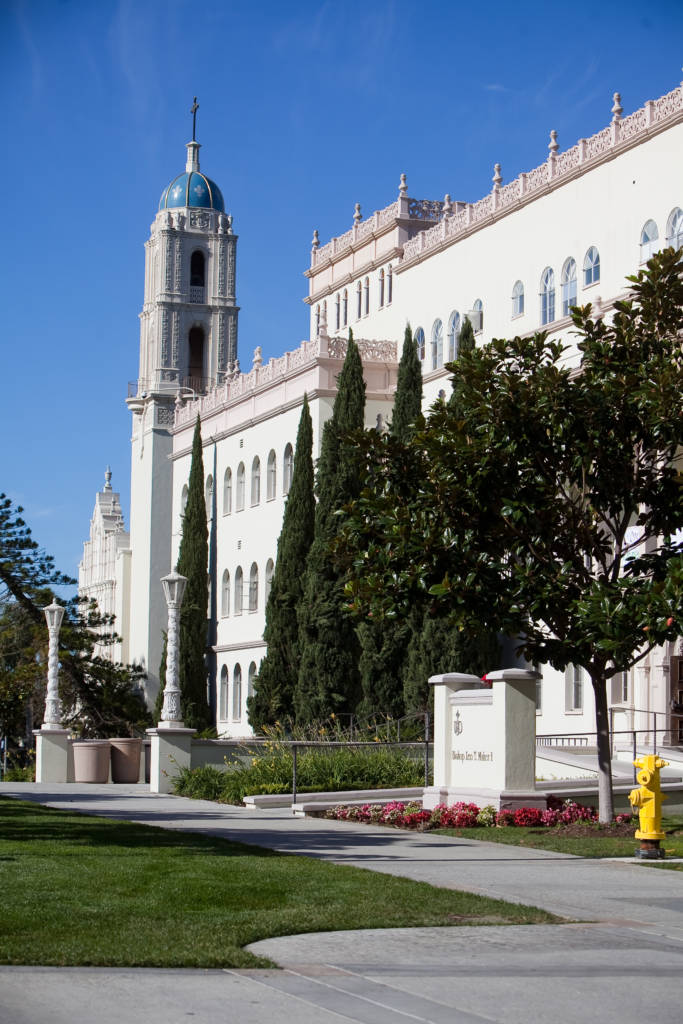



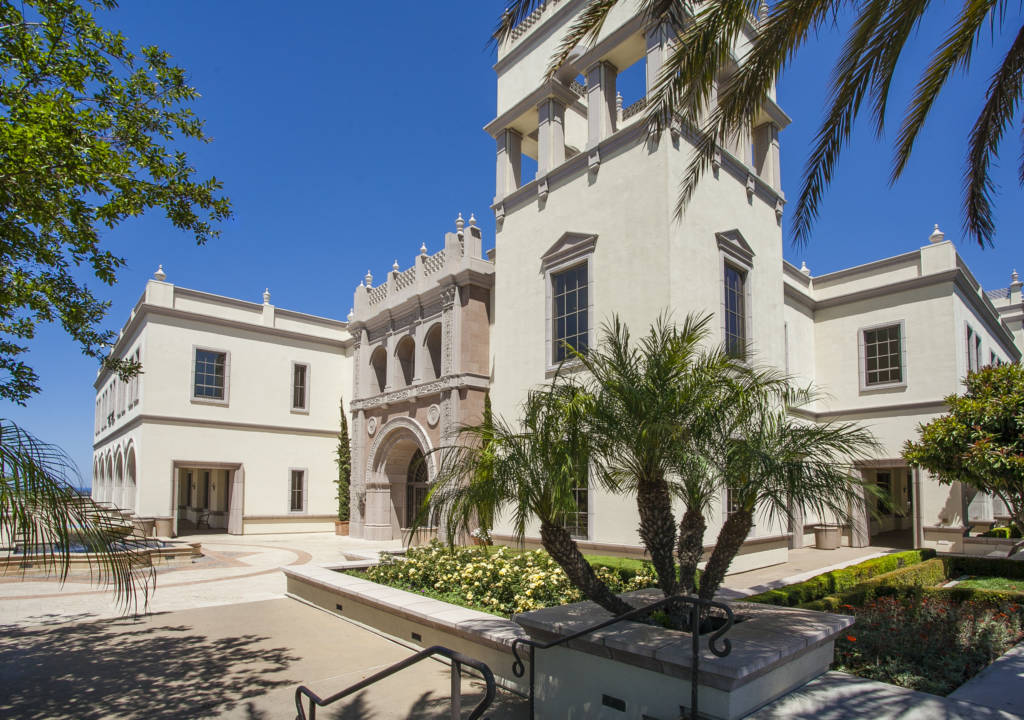
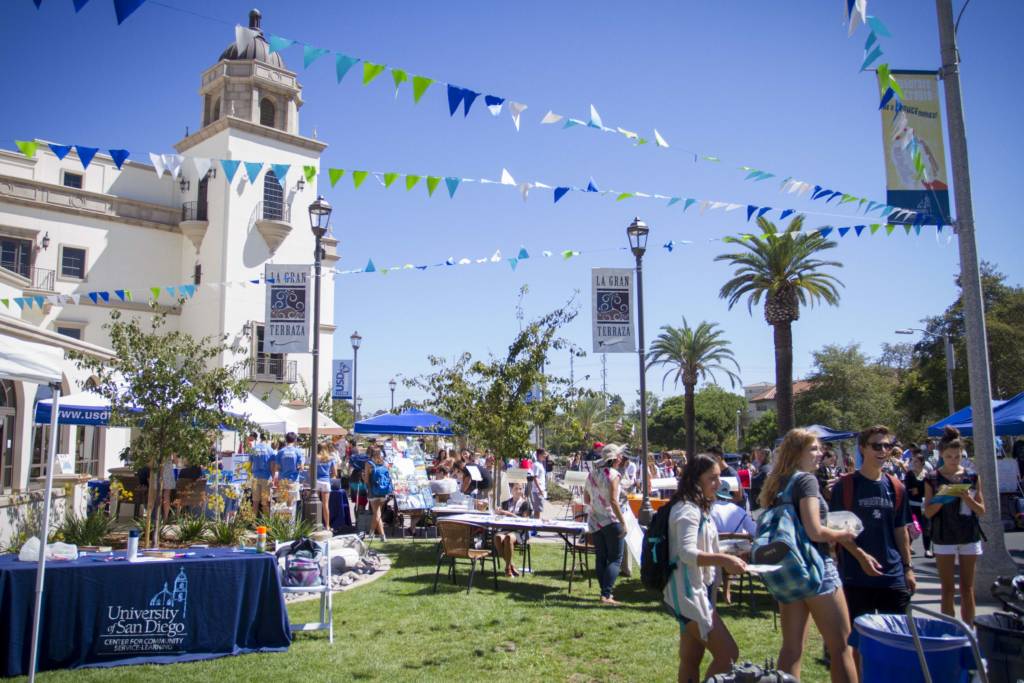

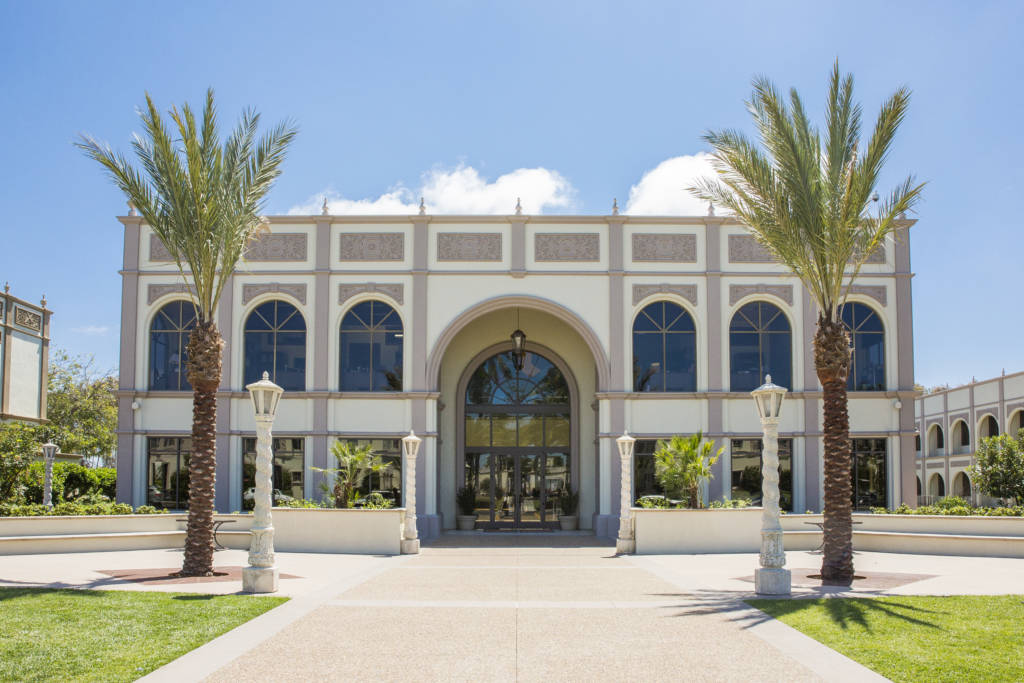
USD Quick Links
- USD Directory (For Faculty or Staff Contact Information)
- Torero Hub
- Health and Wellness
- SOLES Graduate Writing Center
- Military and Veterans Program Center
- Disability and Learning Difference Resource Center
- Copley Library
- Career Development Center
- Campus Recreation (Remote and On-Campus Classes Offered)
Career and professional resources
Whether you're hoping to find a new job or earn a promotion, USD has a wealth of resources available to prepare you for your dream role.
Frequently Asked Questions
How much is my tuition?
Tuition for the MS-ESH program is $965 per unit.
With a total of 30 units, the full cost of tuition for the program is $28,950.
Tuition amounts shown on this website, or in other university publications or web pages, represent tuition and fees as currently approved. However, the University of San Diego reserves the right to increase or modify tuition and fees without prior notice and to make such modifications applicable to students enrolled at USD at that time as well as to incoming students. In addition, all tuition amounts and fees are subject to change at any time to correct errors. Please note that the displayed tuition covers only the cost of courses, and additional expenses such as books and other fees are not included.
How many units is my program?
The online MS-ESH program is a total of 30 units.
Students will enroll in two prescribed courses each semester for a total of six (6) semester units. During your final term, students will enroll in a single 6-unit capstone course only.
Is this a full-time or part-time program?
The University of San Diego considers 9 or more units as full-time student status. Your program is designed to be part-time, and students enroll in just 6 units per semester. There is no full-time option for this program.
How do I register or drop classes?
All students are manually enrolled each semester by the USD Student Success team. If you are not able to enroll for a term or if you need to drop your courses, it is your responsibility to notify your Program Coordinator. All students will be held to the respective drop deadlines and refund schedule detailed in your Student Handbook.
Where do I find my bill and how do I pay it?
Login to your my.sandiego.edu student portal. Under the “My Student Account” tab, review the tutorials for directions on how to view and pay your bill, set up a payment plan, and enroll in eRefund (Direct Deposit). View the “Tuition and Payment Methods” on your Student Success Center for further details.
Where can I view my final grades?
Log into your my.sandiego.edu student portal and navigate to the “Torero Hub” section on the sidebar. Click on the “My Academics” tab and locate the “View My Grades” link in the top-middle section. Alternatively, you can view your program progress at a glance using the “Degree Works” link.
If you notice a grade inconsistency between Canvas and your MySanDiego portal, please email your instructor to verify what the final grade should be. Your instructor has the ability to update the posted grade.
How do I see my degree plan and track my progress?
Log into your my.sandiego.edu student portal and then use the “Degree Works” link to view your degree audit.
You can find the “Degree Works” link in the Torero Hub under the “My Academics” page. If you are interested in requesting a tailored degree plan, please email [email protected].
What if I need to take a break from courses?
If you need to take time off from your program, please email your Program Coordinator or the Student Success team at [email protected]. Since you have submitted your enrollment commitment, our team will automatically register you in courses each term unless you have previously notified the team about taking a break.
How do I order transcripts?
To order your official, unofficial, or e-transcript(s), view the transcript ordering options page. Otherwise, you can view unofficial/order official transcripts through your MySanDiego portal. Under the “Torero Hub” sidebar option, click on the “My Academics” page, then click on “Request Official Transcript” under the “My Classes” section.
When will I get my diploma?
Congratulations on finishing your program! Diplomas are mailed about 6-8 weeks after the degree requirements have been met and processed. Diplomas are mailed to the current address on file at the time degree requirements are completed. (To check your address information, login to your my.sandiego.edu student portal and view your personal information under My Torero Services.)
You will first be emailed a copy of your e-diploma from Parchment prior to receiving your mailed physical diploma.
Who do I talk to if I have additional questions or concerns about my program?
Throughout your program and after graduation, your Student Success team is here to help! We recommend contacting your Program Coordinator directly, but you can also email our team address at [email protected].
In addition to our team, your Academic Director is a great resource!
Where can I find some writing resources?
All writing assignments must be formatted according to APA standards. Discussion posts must contain the appropriate APA citations. If you are unfamiliar with APA formatting, or simply require additional writing support, we recommend referencing the Purdue Online Writing Lab (also called OWL@Purdue). In addition to general writing support, the website includes a special section dedicated to APA formatting guidelines.
To further support your writing, we highly recommend using the School of Leadership and Education Sciences (SOLES) Graduate Student Writing Center. Students are encouraged to submit written course assignments via the digital submission form for online feedback from a professional writing coach. See site for details.
What should I do if I miss a week of class?
This course moves very quickly, and it is important that you turn in all assignments on or before their due dates. If, because of an emergency, you have missed a week or more of course work, please contact your professor immediately to inform them. While there is no guarantee that you will be allowed to make up your work, informing your professor early is the best way to get back on track and finish your course successfully.
Please do not wait more than a week without informing your professor. If your instructor’s email is not already visible on the Canvas course, please use the USD directory to find their contact information.
What can I expect for deadlines in my course?
The 7-week courses traditionally follow a weekly pattern with three important days:
- Tuesdays – When the class/modules start. It’s recommended to read the Module Overview, review readings/media, and begin to think about ideas for the discussion board.
- Fridays – When the initial discussion board posts are due. Remember that posts are due before 11:59 PM PST.
- Mondays – When discussion board replies and assignments are due. Most discussion boards expect 2 replies per week.
Please note that there may be some exceptions to this structure. Always refer to the syllabus for deadline details. Please contact the course instructor with any questions.
What are the course surveys? Do I have to complete them every course?
The course surveys are an opportunity to give your feedback on the course assignments, instructors, pacing, workload, learning management system, accessibility, etc. The feedback is reviewed by school leadership and used to determine how courses should be improved for future iterations. All surveys are completely anonymous – which is why your instructors have to make public announcements asking for everyone to submit their surveys. Feedback in the survey will not affect your final grade.
Course surveys traditionally open during the final weeks of the course and close before final grades are posted. The instructors and USD Student Success Team will remind you to complete these surveys for each class. Your program appreciates the time you take to improve the student experience!
Does USD use latin honors (magna cum laude, summa cum laude, cum laude, etc.) for students graduating from master’s programs?
No, it is uncommon for institutions to offer Latin honors to graduate students because graduate programs already assume a high level of academic achievement and rigor. The idea is that earning a graduate degree itself signifies excellence, making additional distinctions unnecessary: graduate students are held to a high academic standard, and successful completion of a graduate program inherently reflects significant achievement. For this reason, most institutions, including USD, do not offer Latin honors for graduate students.
If you are looking for a way to highlight your high academic achievement at USD, we recommend including your GPA on your resume, LinkedIn, etc.


